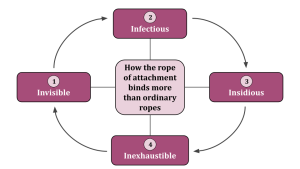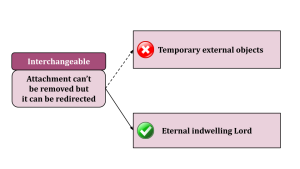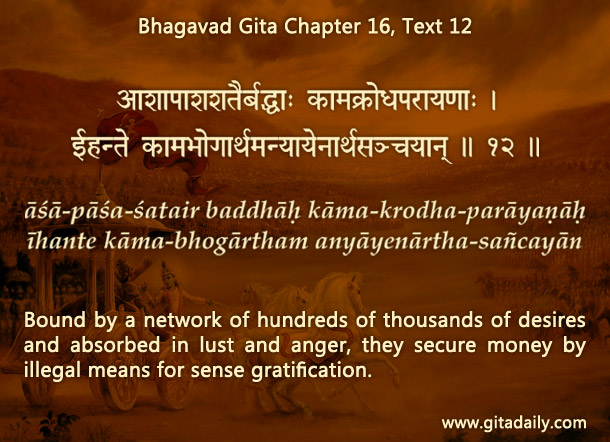 If we saw someone being dragged around bound by a rope, we would be appalled. Yet millions of us are bound by attachments that bind not our body, but our mind (Bhagavad-gita 16.12).
If we saw someone being dragged around bound by a rope, we would be appalled. Yet millions of us are bound by attachments that bind not our body, but our mind (Bhagavad-gita 16.12).
To understand how grave this bondage is, let’s compare it with physical ropes using five parameters.
Invisible: If we see a rope that is likely to entrap us, we will try vigilantly to avoid it. But because the rope of attachment can’t be seen, we rarely try to avoid it.
Infectious: If we go near someone bound by a physical rope, we don’t ourselves become bound. However, if we associate indiscriminately with someone who is attached, their desires subtly seep into our consciousness till they suddenly sweep away our consciousness — it’s as if we are infected by a contagious pathogen.
Insidious: An ordinary rope doesn’t come with a self-strengthening mechanism, but the rope of attachment does. The more we become attached to something, the more we feel so captivated by that object that we indulge in it repeatedly. And each indulgence creates an inner impression that thickens and tightens that rope of attachment.
Inexhaustible: Whereas an ordinary rope ages and automatically weakens with time, the rope of attachment doesn’t. We get exhausted in resisting it, in pandering to it or in alternating through both, but it doesn’t get exhausted. The only way to weaken and cut it is by conscious consistent redirection of desire.
 Interchangeable: A physically bound person can’t change the kind of rope that binds them, but a mentally bound person can. No matter how attached we may be, we can still desire to change. And Gita wisdom guides us toward the ultimate desirable object: the all-loving, all-attractive Divinity, Krishna. The more we desire to love and serve him, the more we are guided from within (10.10) to shift our attachment from temporary external things to the eternal indwelling Lord. Attachment to him is the source of the ultimate freedom and fulfillment.
Interchangeable: A physically bound person can’t change the kind of rope that binds them, but a mentally bound person can. No matter how attached we may be, we can still desire to change. And Gita wisdom guides us toward the ultimate desirable object: the all-loving, all-attractive Divinity, Krishna. The more we desire to love and serve him, the more we are guided from within (10.10) to shift our attachment from temporary external things to the eternal indwelling Lord. Attachment to him is the source of the ultimate freedom and fulfillment.
One-sentence summary:
The ropes that bind physically don’t trap us as much as the attachments that bind mentally.
Think it over:
- Why don’t we resist the rope of attachment?
- How does the rope of attachment entrap us through others and through ourselves?
- How can we break free from the trap of our attachments?
***
16.12: Bound by a network of hundreds of thousands of desires and absorbed in lust and anger, they secure money by illegal means for sense gratification.
To know more about this verse, please click on the image


Leave A Comment